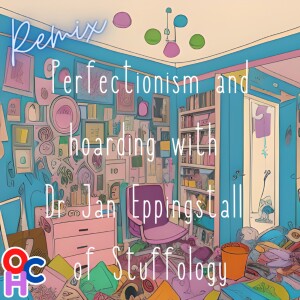
Friday Nov 17, 2023
REMIX: Perfectionism and hoarding with Dr Jan Eppingstall of Stuffology
The topic for today is perfectionism and its connection to hoarding. I talk with Dr Jan Eppingstall about perfectionism and its impact on hoarding behaviour. We share personal experiences and struggles with perfectionism, discussing the fear of failure and the tendency to give up if something cannot be done perfectly.
We also touch upon the importance of psychological flexibility, being present in the moment, and living by our values. Dr. Eppingstall enlightens us with insights on challenging rigid thought patterns, breaking free from the demands of perfection, and embracing personal growth.
- Perfectionism and fear of failure drive hoarding.
- Perfectionism linked to hoarding and obsessive personalities.
- Rigid thinking
- Surprised by others' flexibility
- Children with insecure attachment blame themselves for parents' problems.
- Curiosity, experimentation, and flexibility lead to growth.
- Encouraging exploration leads to personal growth.
- Regretting inaction is a bigger regret.
- Relax, do it wrong, get more done.
- Perfectionism and fear of failure relate to hoarding.
- Concerns over mistakes and parental criticism are prominent.
- Being creative with limited resources to find solutions and not being rigid in following rules or plans.
- Turtle mode hinders logic, self-criticism hampers progress.
- Children with insecure attachment due to a parent's mental illness or preoccupation tend to believe they cause their parents' problems
- They feel pressured to help their parents and seek validation through achievements and obedience to alleviate their parents' sadness or anger.
- Perfectionism linked to trauma response, family expectations.
- Fear of negative emotions, regret of not pursuing dreams.
- People are adaptable and inventive
- Give yourself permission to make mistakes, relax, and get more done
- The reluctance to start or complete tasks to avoid an imperfect outcome
- Self-criticism and lack of confidence as common problems with perfectionism
- Overcoming perfectionism and embracing flexibility
- Psychological flexibility: being present, taking action guided by values
- The importance of curiosity and challenging behaviours
- Living by values rather than solely focusing on goals
- The role of a support system in venturing outside the comfort zone
- Taking small, cautious steps outside the comfort zone
- Opening up slowly leads to personal growth and a sense of accomplishment
- Breaking rigid thought patterns through repeated challenging
- Recognising triggers and behaviours associated with perfectionism
- Cognitive-behavioural therapy (CBT) and acceptance and commitment therapy (ACT) as helpful approaches
- Perfectionism as a manifestation of people-pleasing and trauma response
- Perfectionism leading to feelings of not being enough or worthy
- Using perfectionism as a coping mechanism for emotions and relationships
- Addressing perfectionism through therapy and exploring its underlying reasons
- Progress and success can still be achieved even if things don't go perfectly or as planned
- Regretting not doing the things we wanted to do in life rather than letting go of physical possessions
- Challenging negative "what if" scenarios and highlighting potential positive outcomes
- Demanding standards, self-criticism, fear of wasting or making mistakes in hoarding behaviour
Hosted on Acast. See acast.com/privacy for more information.
No comments yet. Be the first to say something!